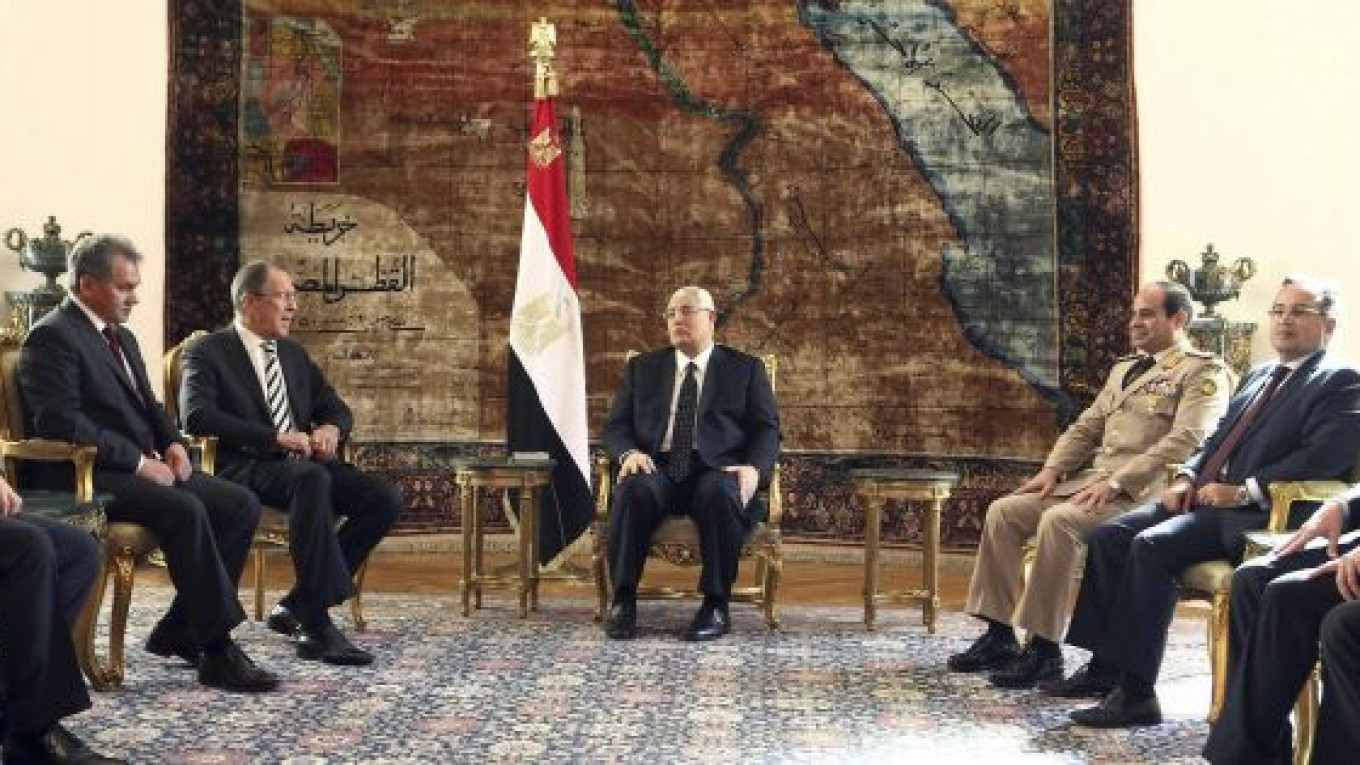Defense Minister Sergei Shoigu and Foreign Minister Sergei Lavrov arrived in Cairo on Thursday for a two-day visit with their Egyptian counterparts to discuss the expansion of Russian-Egyptian military cooperation, in a move that marks renewed partnership after more than three decades of stagnation.
The visit comes amid Cairo's attempts to secure military assistance after the U.S. suspended its $1.3 billion military aid to the country in response to its lack of democratic governance, a situation that has given Russia the opportunity to strengthen its relations with the North African country of 81 million.
Following his meeting with his Egyptian counterpart, General Abdel Fattah al-Sisi, Shoigu said Russia hoped to improve military relations with Egypt and increase the frequency of bilateral exchanges.
"We agreed that in the nearest future, we will take steps for the legal implementation of our deals," Shoigu said after the meeting, referring to projects for military and technical cooperation.
The news of such deals signals renewed military cooperation after Egypt stopped purchasing weaponry from Russia in the 1970s. The countries' current political and economic relations are cordial, but largely insignificant. In 2010, approximately 0.83 percent of the country's exports were sent to Russia, while Egypt accounted for a mere 0.69 percent of Russia's foreign trade.
Russia is now re-emerging on Egypt's weaponry market in the hopes of rekindling the Soviet-Egyptian friendship that thrived during the presidency of Gamal Abdel Nasser from 1956 to 1970.
But some observers say the move is not purely coincidental.
"It is clear that Russia is trying to capitalize — politically, militarily and economically — on the United States' disengagement with Egypt," said Alexei Malashenko, co-chair of the of the Carnegie Moscow Center's Religion, Society, and Security Program.
Egypt is hoping to purchase as much as $2 billion in Russian weaponry, including MiG-29 fighter jets, air-defense systems and anti-tank missiles, according to Ruslan Pukhov, head of the Moscow-based Center for Analysis of Strategies and Technologies.
In comments after Thursday's meeting, Lavrov hinted at the potential Russia sees in Egypt, stressing that Egypt's stability was of primary importance for securing a strong partnership.
"We have confirmed before and are confirming again that Russia wants to see stability in Egypt, with a steadily developing economy and effective political system. We are hopeful that the work being done right now, including on preparing the new constitution … will allow the country to move forward in achieving the desired goals," Lavrov said, Interfax reported.
Malashenko, who remains skeptical that Russia will revive the golden age of its relations with Egypt, was ambivalent about the long-term effects of Russia's outreach to its former ally, however.
"I cannot predict how well Russia will use this chance," he said. "Nor can we tell whether Egypt views Russia as a true strategic partner or only as a tool to put pressure on the United States." ?
The Soviet Union provided Egypt with hefty military assistance and contributed to large infrastructure projects during Nasser's presidency, including the Aswan Dam on the Nile River.
But in 1972, Egyptian President Anwar El Sadat, who replaced Nasser after his death, expelled 20,000 Soviet military advisers. Egypt has not purchased weaponry from Russia since then, instead forging a strong partnership with the United States.
Egyptian Foreign Minister Nabil Fahmy attempted to silence talk of Russia and the United States switching places, however, saying that "Russia's weight is too heavy to be a substitute for anyone," The Associated Press reported.
While the Egyptian side refused to speak about the change of its allies, a senior American official told Buzzfeed that U.S. military aid to Egypt was "irreplaceable."
Since the suspension of American military aid, Saudi Arabia, the United Arab Emirates and Kuwait have pledged at least $12 billion to Egypt.
The Egyptian army, which removed President Mohamed Morsi in July and engaged in bloody clashes with the ousted leader's supporters, has held the spotlight on the country's political stage for decades.
Egypt has been headed by active or retired military men since the country became a republic in 1953, with the exception of Morsi, the country's first democratically elected head of state, who is currently on trial for inciting his supporters to commit violent acts.
Contact the author at g.tetraultfarber@imedia.ru
A Message from The Moscow Times:
Dear readers,
We are facing unprecedented challenges. Russia's Prosecutor General's Office has designated The Moscow Times as an "undesirable" organization, criminalizing our work and putting our staff at risk of prosecution. This follows our earlier unjust labeling as a "foreign agent."
These actions are direct attempts to silence independent journalism in Russia. The authorities claim our work "discredits the decisions of the Russian leadership." We see things differently: we strive to provide accurate, unbiased reporting on Russia.
We, the journalists of The Moscow Times, refuse to be silenced. But to continue our work, we need your help.
Your support, no matter how small, makes a world of difference. If you can, please support us monthly starting from just $2. It's quick to set up, and every contribution makes a significant impact.
By supporting The Moscow Times, you're defending open, independent journalism in the face of repression. Thank you for standing with us.
Remind me later.


